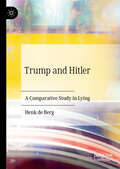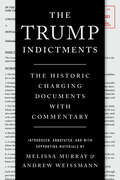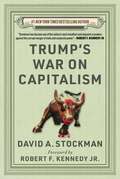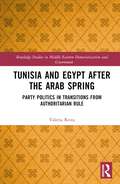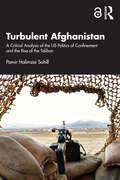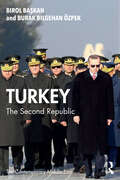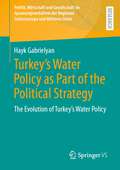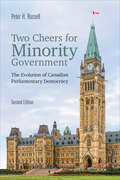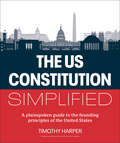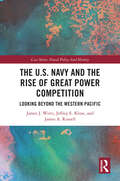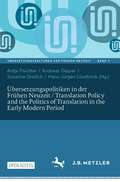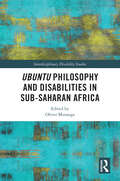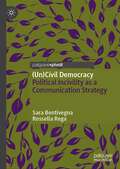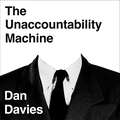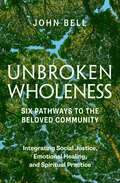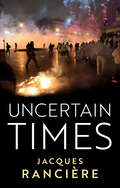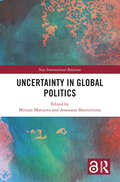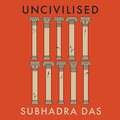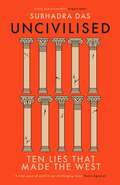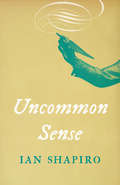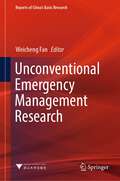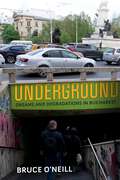- Table View
- List View
Trump and Hitler: A Comparative Study in Lying
by Henk de BergThis book compares Trump and Hitler as political performance artists. It explores their populist self-staging and rhetorical strategies and explains how they connected with their respective audiences. It also analyses the two men’s character, work ethic, and management style. In addition, the book addresses seemingly peripheral issues like the reasons behind Hitler’s toothbrush moustache and Trump’s hairstyle. By demystifying Hitler and Trump, the author throws new light on both of them.
The Trump Indictments: The Historic Charging Documents With Commentary
by Melissa Murray Andrew WeissmannCollecting the four unprecedented indictments against Donald Trump, this essential volume features extensive commentary by NYU law professors and MSNBC contributors Melissa Murray and Andrew Weissmann. <p><p> In the long span of American history, Donald Trump is the first former president to face criminal indictment. He is the subject of a series of explosive charges across four cases: the January 6 case brought by Special Counsel Jack Smith; the election interference case in Georgia; the classified documents case also brought by Special Counsel Jack Smith; and the "hush money" case in New York. The Trump Indictments includes: • An introduction offering historical background and international comparisons for criminal charges against a former political leader. • The four indictments with annotations throughout, including insider notes from an eminent scholar (Murray) and a former federal prosecutor (Weissmann). • A cast of characters, from Trump and his alleged co-conspirators to notable Proud Boys and Oath Keepers who face prison sentences as a result of related January 6 cases. • A timeline that brings together in one place the critical events that led to the four indictments. A necessary handbook for anyone following the trials in 2024, The Trump Indictments will endure as an indispensable record of a democracy at the crossroads. <p> <b>New York Times Bestseller</b>
Trump's War on Capitalism
by David StockmanDonald Trump had all the right enemies while in office—but that was about all he had right. And with the election of 2024 fast approaching, the essence of the moment is this: Lock him out of both the nomination and the Oval Office. David Stockman, the New York Times and Wall Street Journal bestselling author of The Great Deformation, dissects Trump&’s economic policies and exposes him as the failed businessman that he is—not a conservative and definitely not a Republican. The border wall, the tariff war with China, and Trump&’s disastrous response to COVID-19 were all remarkably misguided failures of policy that hurt American prosperity. Even his claims of job creation fell flat too—Trump&’s tenure was the only presidential term in which private payrolls in the US economy actually shrank—well, at least since Herbert Hoover! America cannot endure another four years of Donald Trump. Nor, can it tolerate another election where a woebegone Democrat wins by default owing to the simple fact that they are not Donald Trump. Trump&’s War on Capitalism exposes his miserable record as a big spender, easy moneyman, hard-core protectionist, immigrant-basher, militarist, and all-around Big Government statist—all reason enough to lock Trump out of the 2024 election.
Tunisia and Egypt after the Arab Spring: Party Politics in Transitions from Authoritarian Rule (Routledge Studies in Middle Eastern Democratization and Government)
by Valeria RestaThis book examines the processes of transition from authoritarian rule in Tunisia and Egypt between 2011 and 2014, arguing that differences between the two countries can be explained by the conduct of their respective political parties. Drawing on a new conceptualization of political parties’ agency that considers their unique nature as intermediate and intermediary institutions, the book allows for the identification of those factors driving political parties’ choices in processes of transition. Moreover, thanks to the employment of quantitative text analysis on the electoral manifestos of the parties involved, this work presents new data for the study of party systems in Tunisia and Egypt. Presenting a new toolkit for analysis, Tunisia and Egypt after the Arab Spring ultimately reveals how differing legacies of authoritarian repression across the two countries can help explain why the Tunisian transition culminated with the 2014 democratic constitution, and the Egyptian transition with the 2013 military coup. Conceptually, the book will appeal to those working in comparative politics and those interested in processes of democratization and authoritarian resilience. Nonetheless, the focus on Tunisia and Egypt makes the book suitable reading for anyone interested in Arab politics and the MENA region generally.
Turbulent Afghanistan: A Critical Analysis of the US Politics of Confinement and the Rise of the Taliban
by Pamir Halimzai SahillThis book explores the what, the why, and the how of the Taliban takeover of Afghanistan almost 20 years after their removal from power. It examines how the U.S. discourses on War on Terror and state-building in Afghanistan have taken shape, became dominant over the past two decades, and to delineate their consequences. Also, it highlights how both discourses are representative of wider depoliticization of the society and eventually paved the way for the illiberal, oppressive politics of confinement and necropolitics. The volume will be of great interest to scholars and researchers of politics and international relations, U.S. foreign policy, peace and conflict studies, area studies, especially West Asian and South Asian studies.
Turbulent Afghanistan: A Critical Analysis of the US Politics of Confinement and the Rise of the Taliban
by Pamir Halimzai SahillThis book explores the what, the why, and the how of the Taliban takeover of Afghanistan almost 20 years after their removal from power. It examines how the U.S. discourses on War on Terror and state-building in Afghanistan have taken shape, became dominant over the past two decades, and to delineate their consequences. Also, it highlights how both discourses are representative of wider depoliticization of the society and eventually paved the way for the illiberal, oppressive politics of confinement and necropolitics.The volume will be of great interest to scholars and researchers of politics and international relations, U.S. foreign policy, peace and conflict studies, area studies, especially West Asian and South Asian studies.
Turkey: The Second Republic (The Contemporary Middle East)
by Birol Başkan Burak Bilgehan ÖzpekFocused on the rise of the Justice and Development Party (AKP) over the last two decades, this book discusses and contextualizes key events and developments in Turkish politics, economics and foreign policy.The authors begin by exploring the longer-term historical trends that shaped the country, focusing on Ottoman and Republican legacies, culminating in the formation of the modern state in Turkey. This context, it is argued, is key in understanding the AKP’s emergence since 2002 as the preeminent political power. The book further argues that the AKP achieved this position due to political maneuvers aimed at undermining military influence within politics, its management of the economy and its approach to foreign policy. These three domains are dealt with in successive chapters to help explicate how the AKP built broad societal coalitions and consolidated its power. The book concludes by analyzing contemporary developments: in the face of mounting economic and political challenges, the fate of the AKP, and of Turkey, remain uncertain.Written in an accessible style and grounded in data-driven analysis, the book will appeal to journalists, policymakers, researchers and general audiences interested in the contemporary Middle East, Turkish political economy and international relations.
Turkey's Water Policy as Part of the Political Strategy: The Evolution of Turkey's Water Policy (Politik, Wirtschaft und Gesellschaft im Spannungsverhältnis der Regionen Südosteuropa und Mittlerer Osten)
by Hayk GabrielyanThis book investigates water issues in the Euphrates-Tigris basin between Turkey, Syria and Iraq (Iran). It presents the importance of water in the world and especially for the countries of the Euphrates-Tigris basin, the water resources of the three riparian countries, their advantages and disadvantages, the amount of reservoir construction in the three riparian countries, their water disagreements and conflicts, international water law. The importance of water in the Ottoman period is presented, the evolution of Turkey's water policy in the 20th and 21st centuries, the connection and interdependence of Turkey's water policy with its foreign and domestic policies are shown in detail. Separate reference is made to non-state actors, such as the Kurds of Turkey, Syria and Iraq. The work emphasizes that Turkey is a unique country in the world with its water policy in the Euphrates-Tigris basin: no other country is able to use water in such a multi-purpose way to achieve various goals.
Twilight's Last Gleaming: Can America Be Saved?
by Todd Starnes&“Todd Starnes is a fierce defender of freedom and a great patriot. He has seen, and understands, what is happening to our country like few others—his book is absolutely terrific, a must read!&” —President TrumpPresident Biden ushered in a dark winter of malaise across our great nation. He snuffed out Lady Liberty&’s bright beacon of hope and brought despair to the land. And now we stand at a time of great choosing. Do we choose the path that leads to freedom or the path that leads to tyranny? We face difficult days, but not hopeless days. Together, we can restore the Republic and reclaim our standing in the world. But first, we must remember our roots and return to the values that made our nation great. A deep and abiding desire for freedom and liberty, girded by faith in God, is the essence of who we are. Those are the precepts that must be reaffirmed if America is to be saved.
Two Cheers for Minority Government: The Evolution of Canadian Parliamentary Democracy, Second Edition
by Peter RussellTwo Cheers for Minority Government presents a concise, accessible analysis of the prevalence of minority governments in Canada. Using the Canadian case to reflect on the processes and procedures of the parliamentary system, Peter H. Russell explores the tendency for people in parliamentary government to prefer elections which result in one party getting a margin of seats. Russell aims to explain why a minority government is not only a likely outcome of parliamentary elections in Canada but is also, for most, the best possible outcome. He argues that the best result of parliamentary actions is for no party to end up with a majority of seats in the lower house. This makes for government that is more accountable to the people. The new edition reveals how the increasing frequency of parliamentary elections that do not result in majority governments is a positive development for democracy. Ultimately, Two Cheers for Minority Government aims to help both citizens and politicians understand and make the most of the opportunities presented by minority governments.
The U.S. Constitution Simplified: A plainspoken guide to the founding principles of the United States
by Timothy HarperWhat does the US Constitution mean for you?One of the most revered, imitated, and controversial governmental documents in the world, the US Constitution serves as the foundation for the American government and shapes the lives of Americans every day. But what do you know about its history and the impact it has on guiding an ever-evolving nation? This book provides a clear look at the single document that defines America, including the birth of the Constitution and the history and details of its amendments.This revision covers recent court rulings related to the Constitution and how those decisions have ramifications for everyday Americans. If you've never fully read the Constitution before, this guide will give you an opportunity to learn about the most influential document in US history.
The U.S. Navy and the Rise of Great Power Competition: Looking Beyond the Western Pacific (Cass Series: Naval Policy and History)
by James J. Wirtz Jeffrey E. Kline James A. RussellThis volume describes how technological and geo-political trends are rapidly transforming maritime affairs. A mix of original and previously published material, this volume describes how the 21st-century great power competition is changing the face of naval operations in general, and U.S. Navy operations in the Western Pacific in particular. The rise of an assertive China and its new anti-access and area-denial capabilities threaten the aircraft carrier-based maritime dominance of the U.S. Navy. Military and political trends in the Western Pacific and beyond suggest that the world is encountering a pivotal moment when existing weapons, tactics, and operations might be rendered obsolete by techno-strategic change. This volume considers these developments from three perspectives by describing: (1) the techno-strategic setting; (2) the institutional constraints that impede the ability of the U.S. Navy to respond to these changes; and (3) a new approach to naval force planning and strategy to cope with these developments. The volume culminates in a discussion of sophisticated strategies and operational concepts that position the U.S. Navy and its maritime allies and partners to prevail in today’s techno-strategic churn. This book will be of much interest to students of naval policy, strategic studies, Asia-Pacific politics, and International Relations.
Überlegungen zur kollektiven Psychologie der Ukraine-Krise (essentials)
by Dieter SandnerDiese essentials vermitteln kurz und prägnant wie es zur Entstehung und Beibehaltung einer kollektiven psychologischen Überzeugung in Deutschland gekommen ist, die sich zu Beginn des russischen Einmarsches in die Ukraine innerhalb von wenigen Tagen entwickelt hat. Exemplarisch wird herausgearbeitet, dass es sich hierbei um eine kollektive psychologische Dynamik handelt, die spontan entsteht, wenn sich eine Gesellschaft insgesamt bedroht fühlt. Diese Interpretationen werden mit Interpretationen der russischen Seite und dem realen Verhalten der russischen Regierung konfrontiert. Schließlich wird dargelegt, inwiefern eine kollektive psychologische Analyse eine Lösung der Ukraine Krise ermöglichen könnte.
Übersetzungspolitiken in der Frühen Neuzeit / Translation Policy and the Politics of Translation in the Early Modern Period (Übersetzungskulturen der Frühen Neuzeit #3)
by Annkathrin Koppers Felix HerberthAusgangspunkt dieses Konferenzbands im Open Access ist die Frage nach den Bedingungen, die dafür verantwortlich zeichnen, dass überhaupt und in welcher Form in der Frühen Neuzeit übersetzt wird. Anders formuliert geht es um die grundsätzliche Frage danach, warum bestimmte Texte, Bilder, Zeichenkomplexe etc. eine Übersetzung erfahren, während andere unübersetzt bleiben (müssen). Welche Faktoren nehmen schließlich – im positiven Fall – Einfluss auf die konkrete Ausgestaltung von Übersetzung im Sinne des Übertragungsprozesses von einem semiotischen und kulturellen System in ein anderes? In diesem Zusammenhang kommt ein doppeltes Politikverständnis zum Tragen: einerseits geraten Übersetzungspolitik(en) im Sinne des Konzepts der Translation Policy in den Fokus und mit ihnen soziokulturelle, ökonomische und interkulturelle Einflussfaktoren. Andererseits geht es – spezifischer – um Übersetzungen im Kontext politischer Verhandlungs- und Aushandlungsprozesse und somit um den Zusammenhang zwischen Politics und Translation. The point of departure for this conference volume is the question of what conditions are responsible for whether a translation happens at all. Why are certain texts, images, and sign systems translated while others (must) remain untranslated? And what factors influence the form a translation takes in the process of conveying words, images, or signs from one semiotic, cultural system to another? These questions concern both translation policy – that is, the socio-cultural, economic, and intercultural factors that influence translation processes – and the politics of translation in the specific context of political negotiation processes
Ubuntu Philosophy and Disabilities in Sub-Saharan Africa (Interdisciplinary Disability Studies)
by Oliver MutangaThis book uses Ubuntu philosophy to illuminate the voices of people with disabilities from Sub-Saharan Africa. Disability literature is largely dominated by scholars and studies from the Global North, and these studies are largely informed by Global North theories and concepts. Although disability literature in the Global South is now fast growing, most studies continue to utilise conceptual, theoretical, and philosophical frameworks that are framed within Global North contexts. This presents two major challenges: Firstly, the voices of people with disabilities in the Global South remain on the fringes of disability discourses. Secondly, when their voices are heard, their realities are distorted. This edited book, consisting of 11 chapters, provides case studies from Botswana, Ghana, Lesotho, Uganda, and South Africa, explores disability in various fields: Inclusive education, higher education, environment, Open Distance Learning, and Technical and Vocational Education and Technical Colleges. The book contributes to the ways in which disability is understood and experienced in the Global South thereby challenging the Western hegemonic discourses on disability. This collection of contributions will be of interest to all scholars and students of disability studies, development studies, medical sociology, and African studies.
(Un)Civil Democracy: Political Incivility as a Communication Strategy
by Sara Bentivegna Rossella RegaThis book offers a systematization of the recourse to political incivility by different subjects and in different contexts. The authors argue that incivility has now become a strategic resource that can be used by various actors in the public arena to achieve specific goals. We are referring not only to traditional political subjects, but also to journalists, citizens, movements and protest groups, that is to a plurality of actors who, from different angles, contribute to the construction of the “political spectacle”. This resource can be activated according to circumstances and conveniences, whether their nature be political (to place an issue at the center of public debate or a new actor in the offer range), mediatic (to achieve an increase in visibility or viewership) or relational (to expand one’s visibility and centrality in social media). The book identifies common elements linking the different levels of use of incivility, which can be traced in uncivil forms of communication. These are their expressive power (memorable gestures and unequivocal messages, which are immediately recognizable and visible), their aggregation power (they build group identities, and consolidate allegiances and bonds) and their mobilization power (they galvanize people, and inspire them to participate and take action).
The Unaccountability Machine: Why Big Systems Make Terrible Decisions - and How The World Lost its Mind
by Dan Davies'A corporation, or a government department isn't a conscious being, but it is an artificial intelligence. It has the capability to take decisions which are completely distinct from the intentions of any of the people who compose it. And under stressful conditions, it can go stark raving mad.'When we avoid taking a decision, what happens to it? In The Unaccountability Machine, Dan Davies examines why markets, institutions and even governments systematically generate outcomes that everyone involved claims not to want. He casts new light on the writing of Stafford Beer, a legendary economist who argued in the 1950s that we should regard organisations as artificial intelligences, capable of taking decisions that are distinct from the intentions of their members. Management cybernetics was Beer's science of applying self-regulation in organisational settings, but it was largely ignored - with the result being the political and economic crises that that we see today. With his signature blend of cynicism and journalistic rigour, Davies looks at what's gone wrong, and what might have been, hadthe world listened to Stafford Beer when it had the chance.
UNBROKEN WHOLENESS: Integrating Social Justice, Emotional Healing, and Spiritual Practice
by John Bell&“A holistic vision breathtaking in scope.&”—Frances Moore LappéDistilling a lifetime&’s insights on the triangle of healing emotional pain, social justice work, and spiritual growth, veteran activist and educator John Bell shares personal stories and reflective practices to help us on our path of personal and collective transformationUnbroken Wholeness brings an integrated lens of social justice, trauma healing, and spiritual practice to the work we do in the world and the pressing concerns of our times.Collectively, these writings help us access a view of the world as unbroken, even in the face of obvious suffering and disharmony. With searching questions and easy-to-follow practices, Unbroken Wholeness offers a way for activists to apply mindfulness and insight to bring about healing for seemingly intractable social divisions. &“Skillfully handling our emotional pain about the world while cultivating a joyful and kind heart helps us navigate the troubled waters of our life,&” says John Bell. Continuing the peace work of his teacher, the Vietnamese social activist and Zen master Thich Nhat Hanh, John Bell brings forward the importance of cultivating a practical yet visionary, ennobling view of humankind when engaging in the &“mud&” of daily difficulties that gives rise to the lotus of an enlightened, compassionate heart.
Uncertain Times
by Jacques RanciereThe global triumph of democracy was announced thirty years ago, promising an age of consensus in which the dispassionate consideration of objective problems would give birth to a world at peace. Today, these grand hopes lie in ruins, and the era touted as new has turned out to be remarkably similar to the old order. To understand why this might be so, we need to examine the nature of the consensus itself, which is not the peace that it promised but rather the map of a territory on which new forms of warfare are being waged. The objective reality that imposed itself at the end of the 1990s was an absolutized and globalized capitalism which has produced ever more inequality, exclusion and hate. In this book Jacques Rancière delivers a frank and piercing critique of the globalized capitalist consensus. The invasion of Iraq, the riots on Capitol Hill and the rise of the European far right all attest to the true nature of this consensus, as does the current state-sanctioned racism which exploits the disenchanted progressive tradition and is led by an intelligentsia that claims to be left-wing. At the same time, Rancière praises the dynamism of social movements which affirm the power of the assembly of equals and its capacity for worldmaking: autonomous protest collectives have proven themselves capable of opening breaches in the consensual order and challenging the post-1989 system of domination.
Uncertainty in Global Politics (New International Relations)
by Miriam Matejova and Anastasia ShesterininaThis book engages in a constructive, practical debate on the nature and effects of uncertainty in global politics. International contributors explore the processes associated with different forms of uncertainty in the context of environmental issues, diplomacy and international negotiations, and conflict and security. From the collapse of the Soviet Union to the 1997 and 2008 financial crises to the Arab Uprisings and the European migrant crisis and the COVID-19 pandemic, assessments of many events with lasting consequences on the global order have begun with: “why didn’t we see this coming?” There is much to learn from how phenomena that affect the global order generate uncertainty and what effects such uncertainty has on actors and issues. Presenting perspectives from all corners of the discipline and emerging and established scholars the book provides an up-to-date overview of the state of the literature; a concise yet conceptually rich theoretical framework; a mix of regional and global contemporary issues; process-oriented empirical evidence and methodological tools to assess different forms of uncertainty and propose practical solutions to addressing uncertainty in diverse contexts. The book will be of interest to scholars of global politics, international security, global environmental politics, international organizations and institutions, social movements, and conflict studies.
Uncivilised: Ten Lies that Made the West
by Subhadra DasSome things are a given. The value of a good education. Time's progress. Death.Except most of the ideas that form Western Civilisation are just that - ideas. Taking cues from Greek philosophy and honed in the Enlightenment, certain notions about humanity and human society grew into the tenets we live by, and we haven't questioned them a great deal since. But isn't it time we asked who really benefits from the values at the core of our society? How much truth lies in a science that conjured up 'race'? Who do laws and nations really protect? Why does it feel like time is money? What even is 'art'?And the real question - is the West really as 'civilised' as it thinks it is?This audiobook will put everything back on the table and ask listeners to reconsider what they thought they knew about civilisation. Taking 10 core values of Western Civilisation in turn, it will examine the root of the idea, how it developed, and how it's impacted the way we live. Most importantly it will reveal how each of these ideas was either created in opposition to another group of people, or based on ideas they had first (and better). (Un)civilised will ask listeners to open their eyes to the why behind how they think the world works.(P) 2024 Hodder & Stoughton Limited
Uncivilised: Ten Lies that Made the West
by Subhadra DasPre-order the enthralling and radical book that overturns our assumptions about civilisation and society'A witty and accessible survey of the shortcomings of western civilisation as many people imagine it' ANGELA SAINI, author of Superior'A vital piece of work in our challenging times that reminds us of the rich history and influences outside the West. Das writes with passion and humour to open our eyes to the history that has shaped our world' ROMA AGRAWAL, author of Built and Nuts and Bolts___________Some things are a given: knowledge is power, time is money, justice is blind. But many of the big ideas that underpin Western civilisation are just that - ideas. Taking cues from Greek philosophy and honed in the Enlightenment, certain notions about humanity and society grew into the tenets we still live by today, and we haven't questioned them a great deal since.But what if they're not just ideas? What if they're outright lies? Isn't it time we asked who really benefits from the values at the core of our society? What is unbiased about a science that conjured up 'race'? Who do laws and nations actually protect? What even is 'art'? And the real question: is the West really as 'civilised' as it thinks it is?Uncivilised puts everything back on the table and asks readers to reconsider what they thought they knew about civilisation, starting with the ten lies that have shaped their lives.
Uncommon Sense
by Ian ShapiroA spirited defense of the Enlightenment against assaults from both the left and the right that explains its urgent implications for our contemporary politics Ours is an age when optimism about politics is hard to come by. Ian Shapiro explains why this is so and, without minimizing the daunting challenges, spells out an appropriate response. Written in the indomitable spirit exemplified by Tom Paine, Uncommon Sense is a rich source of insight and inspiration in dark political times. The Enlightenment commitments to reason and science are under assault from the Postmodern Left and the Authoritarian Right. Shapiro explains why the attacks are misguided and politically destructive. He agrees with the critics that there are no universal principles of justice that transcend political battles and no fair, impartial rules to govern the distribution of income, wealth, rights, or opportunities. But abandoning the search for them as futile does not mean junking the Enlightenment&’s core political goal: to deploy the tools of reason and science to fight domination. Democracy is essential to vindicating that goal, yet citizens in many democracies are profoundly alienated and many democracies are in danger of failing. Shapiro explains what has gone wrong, debunks ill-considered remedies, and spells out better ones—deepening and extending his previous writing on political theory and democratic politics.
Unconventional Emergency Management Research (Reports of China’s Basic Research)
by Weicheng FanThis book mainly introduces the research overview, research results and follow-up prospects of “Unconventional Emergency Management Research”, a major research plan of National Natural Science Foundation of China (hereinafter referred to as the Plan). The Plan has carried out innovative research around major strategic fields and directions on emergency management. A total of 121 projects were funded by the Plan, including 92 Fostering Projects, 25 Key Projects and 4 Integrated Projects, with a total funding of 120 million RMB. From the perspective of major national needs and scientific discipline development, the book focuses on three key scientific issues: information processing and evolution modeling of unconventional emergencies, emergency decision-making theory of unconventional emergencies, and psychological and behavioral response laws of individuals and groups in emergency situations. The publication of this book aims to provide more powerful support for the research and exploration in public security and emergency management.
Underground: Dreams and Degradations in Bucharest (The City in the Twenty-First Century)
by Bruce O'NeillThis book gets to the bottom of the twenty-first-century city, literally. Underground moves beneath Romania’s capital, Bucharest, to examine how the demands of global accumulation have extended urban life not just upward into higher skylines, and outward to ever more distant peripheries, but also downward beneath city sidewalks. Underground details how developers and municipal officials have invested tremendous sums of money to gentrify and expand Bucharest’s constellation of subterranean Metro stations and pedestrian pathways, basements and cellars, bunkers and crypts to provide upwardly mobile residents with space to live, work, and play in an overcrowded and increasingly unaffordable city center. In this sense, the repurposed underground facilitates dreams of middle-class ascendancy. This sense of optimism, the book shows, invariably gives way to ambivalence as the middle classes confront the indignities of being incorporated into the city from below.Bruce O’Neill argues that these loosely coordinated efforts have not only introduced novel forms of social fragmentation but also a new aesthetics of inequality that are fundamentally shaping where and how the middle classes fit in the city. Pushing urban studies beyond a cartographic perspective—with its horizontal focus upon centers and peripheries, walls and gates—O’Neill brings into focus the vertical dynamics of gentrification that place some “on the bottom” and others “on top” of the city. As cities around the world extend further downward in the name of development and sustainability, Underground makes clear that scholars and practitioners of the twenty-first-century city will need to become ever more attuned to the cultural politics of urban verticality, asking not just who is included in the city and who has been pressed outside of it, but also who is on top and who is placed on the bottom.
